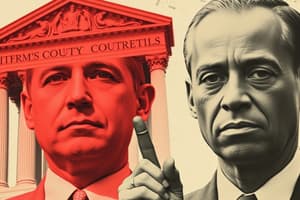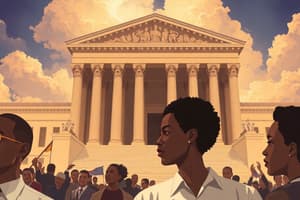Podcast
Questions and Answers
Match the types of organizations with their descriptions:
Match the types of organizations with their descriptions:
Departments = Major subdivisions of the federal government Independent agencies = Government organizations with a narrower policy focus Independent regulatory boards and commissions = Regulate various businesses or industries Government corporations = Provide public goods or services not profitable for private enterprise
Match the roles of the bureaucracy with their definitions:
Match the roles of the bureaucracy with their definitions:
Administrator = Implements laws passed by Congress Rule maker = Fills in details about vague policies Judge = Interprets laws within a department or agency Policy analyst = Evaluates the effectiveness of regulations
Match the legal systems with their characteristics:
Match the legal systems with their characteristics:
Civil-law = Code-based legal system Common-law = Case-based legal system Adversarial system = Two opposing parties present their case Inquisitorial system = Judge actively investigates the case
Match the components of the United States Court System with their jurisdiction:
Match the components of the United States Court System with their jurisdiction:
Match the terms with their definitions:
Match the terms with their definitions:
Match the following landmark civil rights cases with their primary focus:
Match the following landmark civil rights cases with their primary focus:
Match the types of discrimination with their definitions:
Match the types of discrimination with their definitions:
Match the groups with their historical experiences of rights denied:
Match the groups with their historical experiences of rights denied:
Match the types of congressional representation with their descriptions:
Match the types of congressional representation with their descriptions:
Match the committees in Congress with their functions:
Match the committees in Congress with their functions:
Match the following concepts related to the presidency with their definitions:
Match the following concepts related to the presidency with their definitions:
Match the following terms with their descriptions in bureaucracy:
Match the following terms with their descriptions in bureaucracy:
Match the following acts related to civil service with their purposes:
Match the following acts related to civil service with their purposes:
Match the following categories of federal agencies with their functions:
Match the following categories of federal agencies with their functions:
Match the following presidential roles with their descriptions:
Match the following presidential roles with their descriptions:
Match the following bureaucratic characteristics with their principles:
Match the following bureaucratic characteristics with their principles:
Match the following historical presidential eras with their characteristics:
Match the following historical presidential eras with their characteristics:
Match the following items with their importance in the democratic process:
Match the following items with their importance in the democratic process:
Flashcards are hidden until you start studying




